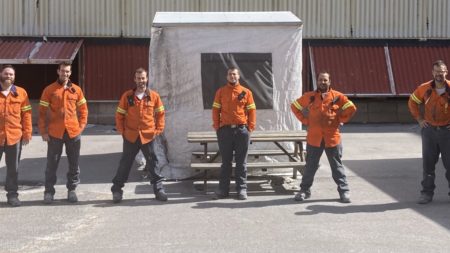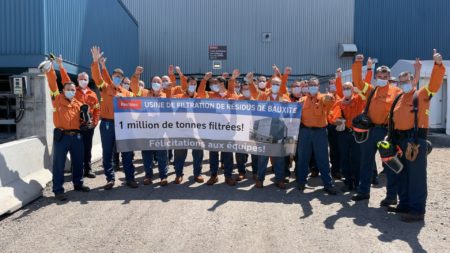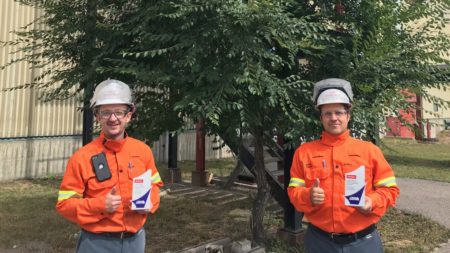From a 24- to a 36-Hour Work Cycle

Pictured: Frédéric Huard, Samuel Dufour, Marc-Olivier Côté, Michaël Morin and Gabriel Cauchon-Baril, Anode Changers.
Last April, the teams at Grande-Baie Works were busying implementing an action plan aimed at transitioning the work cycle from 24 hours to 36 hours. The key factors to the success of this project, which involved several work committees, were operational excellence and productive collaboration between employees. The project spanned about four months and was carried out with full transparency. The teams are proud of the time and energy they invested in ensuring a smooth transition of the work cycle.
“The challenge was to return to a 36-hour work cycle while maintaining a 19-day anode cycle,” explained Jérémy Bérubé, Process Engineer. “The solution was to create a hybrid work cycle, that is, a 36-hour cycle spread over 18 days with a transition day that allows us to complete the cycle of operations in 19 days, as planned.”
To achieve this, three months of tests were carried out on half of the smelter to confirm the performance of the process and minimally impact operations. This transition involved many changes, particularly in the sequence of operations. “There was a lot of preparation work before the transition,” added Bérubé, “because we had to be able to coordinate the different operations between the two sectors, adjust the work schedules and implement the changes in tasks for operators.”
One of the advantages of the 36-hour cycle is that it frees up two extra work areas every shift, resulting in less coactivity between the different operations. These work areas are now used by maintenance, which is a perfect solution for optimising these blocks of time.
The new division of tasks increases the availability of equipment, and the bridges are less used, reducing coactivity,” said Michaël Gallant, Operations Supervisor. “This also has an impact on productivity because there is increased metal flow, so fewer work delays.”
“Everyone is happy with this project,” said Jean-Philippe Houde, Operator. “Our work is more fluid due to the availability of equipment. Our operations are more efficient; our time management is better; and we can operate the tanks without worrying about coactivity.”


